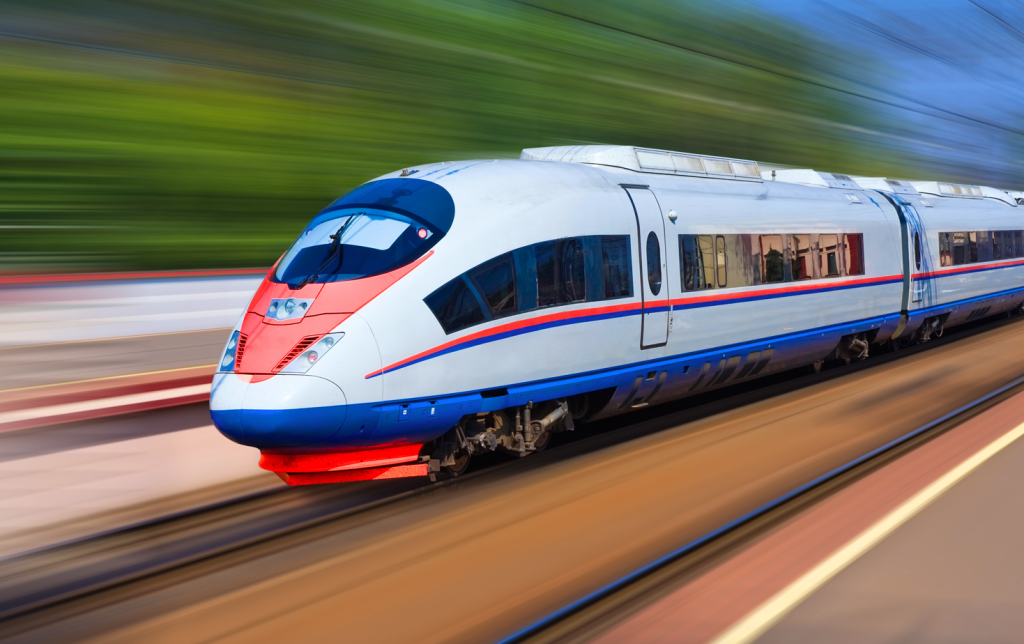WASHINGTON, DC—Representatives Suzan DelBene (WA-01) and Seth Moulton (MA-06) introduced legislation to invest $205 billion in a national high-speed rail system that would provide Americans with faster, cleaner travel options and create at least 2.6 million American jobs. This legislation comes on the heels of the Biden administration awarding a historic $8.2 billion for high-speed rail and pipeline projects across the country.

The bill will help build a national high-speed rail system by:
- Investing $41 billion annually in high-speed and higher-speed rail through grants administered by the Federal Railroad Administration over 5 years, with incentives for $38 billion or more in nonfederal funding;
- Prioritizing the evaluation of high-speed rail grant applicants based on equity, resilience, sustainability, economic development potential, and climate;
- Prioritizing high-speed rail grants for regions not serviced by the aviation industry or where the government subsidizes aviation routes;
- Creating funding flexibility and transit-oriented development incentives for non-federal partners, including state and local transportation agencies and private partners; and
- Developing comprehensive, performance-based safety regulations and standards for high-speed rail to reduce project costs and expedite development.
The bill would provide the country with a number of transportation improvements, including:
- Better connecting economic megaregions along high-speed rail corridors to increase productivity and global competitiveness, with a return on investment that far outweighs the cost of capital investment;
- Creating a coordinated, national transportation strategy that creates competition and reduces strain on our highway and aviation networks as high-speed rail serves high-volume corridors up to 750 miles;
- Creating clean, reliable, and safe transportation from city centers to city centers, with less time in security lines and waiting in terminals, fewer weather disruptions;
- Building more walkable communities with economic development around train stations in city centers;
- Connecting hot job markets to communities where it is more affordable to live;
- Increasing national security and exports through increased U.S. independence from imported fuels;
- Making America more competitive with China’s use of high-speed rail in its Belt and Road Initiative; and
- Creating new American industries, such as manufacturing and high-grade steel production, even in communities that are far from the proposed new transportation corridors.
“This legislation marks a transformative step toward creating a more connected, sustainable, and prosperous future for all Americans,” said DelBene. “By investing in a national high-speed rail network, we are not only alleviating strain on our highways and airports and creating safer communities, but we are also strengthening productivity and lowering carbon emissions. An expanded high-speed rail system would have an incredible value in the Pacific Northwest, connecting key population centers from Vancouver to Portland and beyond.”
“High-speed rail is faster, cleaner, safer, and better for our economy. It will connect people to more jobs in new places, give Americans freedom and choice in how they travel, and put us on par with the rest of the world. This bill is the plan that will get us there,” said Moulton. “We spend vast amounts of money subsidizing planes, which are delayed by weather, and roads, which are crumbling nationwide. We now have a chance to think big and think differently. Let’s not waste the opportunity.”
“Rail Passengers Association’s polling shows that 78 percent of Americans want a bigger, better passenger rail network. People should have the freedom to choose safe, reliable, fast, environmentally friendly trains as an alternative to congested and dangerous highways and expensive airlines. Investing new Federal dollars, coupled with Rep. Moulton’s policy innovations around streamlining project delivery and tax incentives for freight railroads, will produce results. The American High-Speed Rail Act will not only improve the experience of riders, it will also connect long-neglected communities to the economic benefits fast, safe, efficient mobility brings. Rep. Moulton’s leadership on this issue has been visionary and steadfast, and we support his efforts to give Americans the transportation network they deserve,” said Rail Passengers Association President & CEO, Jim Mathews.
This legislation is sponsored by Representatives Brendan Boyle (PA-02), Emanuel Cleaver (MO-05), Don Beyer (VA-08), Barbara Lee (CA-12), Jonathan Jackson (IL-01), Dina Titus (NV-01), Bonnie Watson Coleman (NJ-12), Juan Vargas (CA-52), Sheila Cherfilus-McCormick (FL-20), André Carson (IN-07), Sean Casten (IL-06), Andrea Salinas (OR-06), Mark Takano (CA-39), Jake Auchincloss (MA-04), Alexandria Ocasio-Cortez (NY-14), Josh Gottheimer (NJ-05), Jesús Garcia (IL-04), Jamaal Bowman (NY-16), Jennifer McClellan (VA-04), Hank Johnson (GA-04), Tom Suozzi (NY-03), Suzanne Bonamici (OR-01), Eleanor Holmes Norton (DC-At Large), Morgan McGarvey (KY-03), Zoe Lofgren (CA-18), Earl Blumenauer (OR-03), and Gwen Moore (WI-04).
This legislation is endorsed by the US HSR Coalition, Rail Passengers Assn, American Train Dispatchers Association (ATDA), Brotherhood of Locomotive Engineers and Trainmen-International Brotherhood of Teamsters (BLET-IBT), Brotherhood of Maintenance of Way Employee Division-International Brotherhood of Teamsters (BMWED-IBT), Brotherhood of Railway Carmen (BRC), Brotherhood of Railroad Signalmen (BRS), International Association of Machinists and Aerospace Workers (IAM), International Brotherhood of Boilermakers, Iron Ship Builders, Blacksmiths, Forgers and Helpers (IBB), National Conference of Firemen & Oilers, SEIU (NCFO), International Association of Sheet Metal, Air, Rail and Transportation Workers-Mechanical Division (SMART-MD), International Association of Sheet Metal, Air, Rail, and Transportation Workers–Transportation Division (SMART-TD), Transportation Communications International Union (TCU), and the Transport Workers Union of America (TWU).
The full text of the legislation can be found here.
SOURCE: Office of Suzane DelBene
Author: Lynnwood Times Staff












